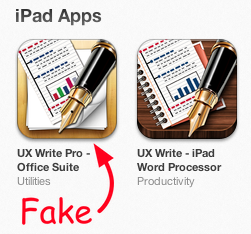Over the last couple of weeks I’ve been dealing with a very frustrating problem. I’ve become aware of three different instances in which unauthorised, repackaged copies of UX Write have been submitted to and approved for sale on the app store, each under a different name. I’ve been going through the standard process to pursue these cases, but decided to post here as well, to clarify that these copies are not legitimate versions. The genuine version of UX Write is available on the app store here.
The unauthorised versions are as follows:
- Document Master, sold by by Guilin Yin
- Word Touch, sold by by Sun Yata
- Word to Go, sold by by Ai Landa
All three are verbatim copies of UX Write version 1.1.4, with only the name and icon changed. The Getting Started guide has been modified to use the name “Document Master”, even in the case of the last two apps. The screenshots on the app store are completely inaccurate and the descriptions highly misleading, in many cases listing features the app does not actually provide.
The only reason I even became aware of these is because the people who did the repackaging made a certain mistake (the details of which I won’t go into) which results in the app crashing under certain circumstances, where the original does not. Since the actual program itself is unmodified, it still uses my email address as the destination for all user-submitted bug reports and feedback. I’ve received emails about these from more than 200 people so far, none of whom initially realised that what they’d purchased was an unauthorised copy.
Piracy is a fact of life in the software industry and ultimately there’s nothing you can do to stop it. It would not surprise me one bit to see copies of UX Write on the Pirate Bay or other sites that have apps for downloading to jailbroken devices. But the app store is different – it’s run by Apple, who review every submission to ensure it complies with their rules, and once approved, they earn a 30% cut of every sale. So while I wouldn’t even bother spending time trying to deal with copies posted on torrent sites or similar, the nature of the app store is such that I think it’s reasonable to expect a higher standard from it.
The last time something like this happened, Apple refused to do anything about it and told me I had to deal with it myself. I made it clear to them that I’m expecting a better answer this time, and the people I spoke to were very understanding and I’m hopeful they will eventually remove the apps. After all, telling developers such as myself to email the people selling pirated copies to ask if they’d please stop doing so is not, in my opinion, a viable solution. There’s nothing to stop the other party from ignoring emails, refusing to take their copies down, or simply doing so but then resubmitting with a new account and a different name.
I don’t directly blame the reviewers for approving these copies in the first place – there are hundreds of thousands of apps out there and it must be huge task to manage it all. But the process is clearly broken, and needs to be fixed. I’m due to attend WWDC in a couple of weeks and hope to have the opportunity there to speak with people from Apple about the issue and how the situation could be improved. I’m far from the only developer affected by this problem – in checking for other copies of UX Write, I’ve found many other instances of apps from other companies being repackaged and approved as well; it’s clearly a widespread problem.

